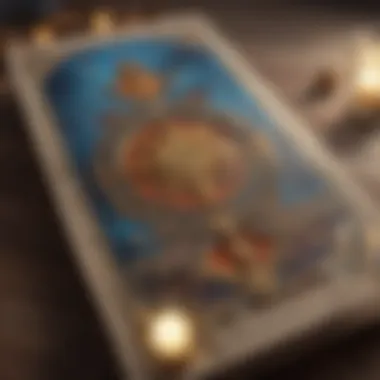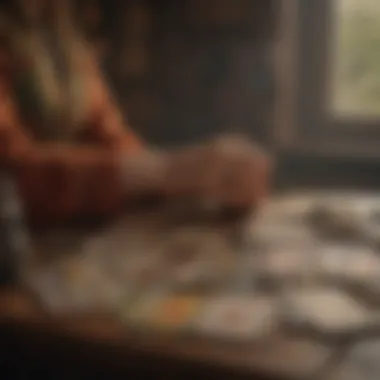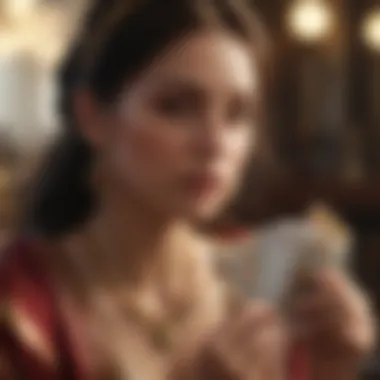Exploring Tarot: Questions for Self-Discovery


Intro
In the quest for self-understanding, tarot emerges as a remarkably rich tool. Through structured inquiries drawn from personal reflection, tarot practices encourage deeper insights into one's emotional landscape, interpersonal dynamics, and various life paths. These questions not only illuminate one's current experiences but also echo the universal truths that reside within each of us. This article aims to serve as a guide in exploring these questions, facilitating a personal exploration that resonates with the many layers of your existence.
By interacting with tarot, you are not just drawing cards, but opening a dialogue with your inner self. Each card drawn can initiate powerful questions that lead to a greater understanding of your identity and motivations. It sets the stage for personal reflection and growth, allowing you to investigate different facets of life.
Understanding which questions to ask can significantly influence the insights gained from a tarot reading.This article will categorize inquiries that tap into emotional understanding, relational dynamics, and individual strengths, thereby embracing a holistic approach to self-exploration.
The following sections will unravel the myriad aspects of tarot inquiries, setting a framework through which you can enhance your personal explorations and subsequently deepening your relationship with the cards.
Let us embark on this journey of introspection and revelation, utilizing tarot as a prism through which to explore our innermost selves.
Intro to Tarot and Self-Discovery
The exploration of tarot as a tool for self-discovery is both profound and enlightening. Tarot cards serve not only as a medium for divination but also as instruments for introspection. The practice allows individuals to delve deeper into their psyche, uncovering layers of thought and emotion that often lie dormant. Understanding how to effectively use tarot for personal insight can unveil paths of clarity regarding one's life journey.
In this article, we will explore how tarot can facilitate self-discovery through intentional questioning. By asking the right questions, individuals can use tarot to reflect on various aspects of their lives, be it emotions, relationships, or personal strengths. This serves as a guide not just for clarity but also for transformative growth. Consequently, the intention behind each tarot reading becomes clearer, directing focus where it is most needed.
Understanding Tarot's Role
Tarot plays a multifaceted role in personal insight and exploration. Each card within the deck encapsulates archetypal energies that symbolize various life situations, emotions, and decisions. When reading the cards, one can interpret these symbols to reveal hidden truths. This is why a well-informed reader benefits as the nuances in card interpretations can lead to deeper insights.
Moreover, the act of shuffling and selecting cards encourages a meditative state that can enhance one’s intuitive abilities. Through this process, individuals can tap into their subconscious, accessing knowledge that might otherwise remain hidden. This connects tarot with the journey of self-discovery in an impactful way.
Connection Between Tarot and Personal Insight
The link between tarot and personal insight is characterized by the reflective process it encourages. Tarot readings prompt individuals to confront inner truths and questions they may hesitate to explore. Each card drawn may resonate with corresponding life truths, allowing individuals to grasp their current emotional or mental state better.
Furthermore, examining the meaning behind specific cards can lead to insights about personal challenges and aspirations. The context provided by tarot becomes a catalyst for greater self-awareness. In this light, tarot is not merely about predicting the future; it’s more about understanding the self. To transform one's life journey, it is crucial to utilize tarot as a means for establishing a connection between the current self and the desired self.
The Importance of Asking Questions
Asking questions is at the very heart of adequately utilizing tarot for self-discovery. Questions serve as the bridge between the inquirer and the insights the tarot cards can provide. They shape the reading, direct the focus, and help to elicit personal truths that may remain hidden otherwise. A well-formulated question taps into the seeker’s subconscious, sparking revelations and prompting reflections that can lead to a deeper understanding of oneself.
The act of questioning encourages active engagement with the tarot process. It shifts the role of the reader from merely interpreting the cards to deeply analyzing their meanings in the context of personal experiences. Through this dynamic interaction, individuals can glean information that feels relevant and tailored to their unique situations.
Moreover, questions enable a clearer framework when it comes to analyzing the results of a tarot reading. Specific and thought-provoking questions can yield specific answers. This specificity helps in navigating responses, leading to actionable insights instead of vague interpretations. Without precise questions, readings can become muddled, losing their potential value.
Why Questions Matter in Tarot
Questions in tarot readings define the journey into self-exploration. They establish the context and significance of the reading itself. When a question is formulated thoughtfully, it serves as the lens through which the cards are interpreted. This is significant for a few reasons:
- Clarity: Well-defined questions lead to clearer and more relevant insights.
- Direction: They create a specific path for the reader to follow, guiding the interpretation of the cards.
- Engagement: Thoughtful questions encourage deeper emotional and cognitive engagement with the reading.
When framing a question, it is important to strike a balance; overly broad questions may yield less informative responses, while overly specific questions may limit the insights gained. Thus, the key lies in crafting inquiries that are open enough to allow for nuanced interpretations yet specific enough to be practically useful.
Framing Questions for Clarity
Framing the right questions involves a few considerations. First, clarity in wording is essential. Ambiguous terminology can lead to misinterpretations. Ask questions that eliminate vagueness. Consider examples like:


- Instead of "What is happening in my life?", ask "What influences are impacting my current emotional state?"
- Instead of "Will I be successful?", consider "What steps can I take to enhance my chances of success in my career?"
Second, consider the emotional tone of the query. Questions directed towards positive action or reflecting on opportunities are often more fruitful than ones focusing solely on problems. This proactive approach nurtures growth and reflection rather than merely seeking momentary reassurance.
Lastly, reviewing the questions after you have framed them can be beneficial. Check if they encapsulate what you genuinely wish to explore. This practice ensures your inquiries resonate on a personal level, making the tarot reading more meaningful and significant.
The quality of your questions determines the impact of your tarot insights. An engaged inquiry opens paths to self-discovery.
Categories of Tarot Questions
In the realm of tarot, the questions we pose serve as a guiding light in navigating the shadows of our subconscious. Understanding the categories of these questions is essential for optimizing personal explorations. Each category addresses a distinct area of life, offering a structured approach to self-discovery that resonates with individual experiences. By categorizing questions, one can focus their readings, ensuring that insights are relevant and tailored to their current circumstances. This enhances the overall effectiveness of the tarot as a tool for introspection.
Questions about Emotions
Emotions serve as a crucial lens through which we experience life. Questions in this category can uncover hidden feelings and help clarify emotional distress or joy. It is important to ask: What emotions do I struggle to express? or How do my emotions influence my decisions? By delving into these inquiries, individuals can gain a deeper understanding of how emotions shape their interactions and overall well-being. This can be especially beneficial for those navigating challenging emotional landscapes, providing a clearer path to acceptance and understanding.
Questions About Relationships
Relationships are a core component of human experience, shaping our identity and fulfillment. Tarot questions regarding relationships can focus on both romantic and platonic dynamics. Questions such as: What lessons am I learning from my current relationships? or How can I communicate better with those close to me? can channel significant insights. Exploring the nature of these connections through tarot not only highlights areas for growth but also fosters a greater sense of empathy and connection with others. Understanding our relational patterns enables us to nurture healthier interactions.
Questions Regarding Life Purpose
The search for life purpose is a profound journey many undertake. When framing questions in this sphere, one might ask: Am I on the right path for my personal goals? or What passions can I pursue that align with my values? These inquiries can reveal underlying motivations and aspirations that often go unnoticed. Tarot can serve as a mirror, reflecting one's authentic self and guiding them toward their true calling. This exploration can ultimately lead to a more fulfilling existence, grounded in clarity and intention.
Questions to Assess Strengths and Weaknesses
Self-awareness is a precursor to personal growth. Questions in this category, such as: What are my innate strengths? or What weaknesses hinder my progress? provide a critical viewpoint on one’s abilities. By understanding both strengths and weaknesses, an individual can strategize on how to leverage their talents while addressing areas in need of improvement. This self-assessment aspect of tarot encourages ongoing growth, fostering resilience and adaptability.
Questions for Reflection and Growth
The pursuit of self-improvement is a continuous journey. Questions centered on reflection might include: What past experiences have shaped my current outlook? or In what areas do I wish to see growth? These inquiries promote critical thinking and introspection, enabling individuals to learn from both positive and negative past encounters. Incorporating these reflections into their tarot practice can guide them toward actionable steps for evolution. Ultimately, this category prompts a holistic view of oneself, allowing for a richer self-discovery experience.
Specific Tarot Questions to Consider
Understanding specific tarot questions is crucial in the context of self-discovery. The effectiveness of tarot as a tool lies not just in the cards drawn but, importantly, in the questions posed. Questions guide the reading, providing focus and direction. They can illuminate areas of our lives that require attention or clarity.
By framing questions thoughtfully, individuals can dive deeper into their emotions, assess their relationships, and explore life’s complexities. This section will unfold various types of questions that can be particularly enlightening.
Self-Reflection Questions
Self-reflection questions invite personal contemplation. They prompt you to examine inner thoughts and emotions. For example:
- What patterns do I notice in my behavior?
- How do I react to stress or challenges?
These inquiries create a space for honesty. The insights gained can lead to profound understanding of oneself. Tarot cards drawn in response to these questions may reveal underlying motivations and beliefs, assisting in the journey toward self-awareness.
Exploring Past Influences
Understanding the past is vital for personal growth. Questions about past influences uncover how earlier experiences shape current beliefs and behaviors. Consider asking:
- What past relationships have defined my outlook?
- How have my childhood experiences influenced my adult choices?


These reflections can direct attention to unresolved issues or patterns that may need addressing. Tarot readings focused on the past can reveal lessons learned and how they apply to present situations.
Visioning Future Possibilities
Future-oriented questions can inspire hope and motivation. They encourage individuals to envision what they desire for themselves. Consider the following inquiries:
- What are my goals for the next year?
- How can I align my actions with my aspirations?
Through tarot, exploring future possibilities can help clarify desires. The reading serves as a reflective exercise, allowing contemplation of various pathways and choices.
Assessing Current Life Challenges
Life is replete with challenges. Specific questions about current difficulties can provide clarity and insight. For instance:
- What obstacles are standing in my way right now?
- How can I navigate my current struggles more effectively?
While seeking guidance from tarot, these questions facilitate a deeper understanding of problems. They can reveal not only aspects that can be changed but also emotional responses attached to these struggles, promoting healing.
Invoking Intuition for Decisions
Decision-making is often complicated. Invoking intuition through tarot helps in weighing options. Relevant questions include:
- What does my intuition tell me about this choice?
- How can I make decisions that resonate with my true self?
Using tarot in decision-making encourages listening to one's inner voice. It allows for a blend of rational thought and intuitive insight, leading to more congruent choices in life.
Integrating Tarot Insights into Daily Life
Integrating tarot insights into daily life is crucial for personal growth and continual self-reflection. This process allows individuals to align their actions and decisions with the deeper understanding gained from tarot readings. It emphasizes the importance of not just viewing tarot as a mystical tool, but as a practical guide that can influence day-to-day choices. By applying insights from readings, maintaining a tarot journal, and establishing a daily tarot practice, individuals enhance their self-awareness and effectively navigate life's challenges.
Applying Insights from Readings
When insights from tarot readings are applied in daily living, they enable a clearer understanding of emotions and situations. This practice involves recognizing patterns from cards and using them as reference points for one’s circumstances. For instance, if a reading highlights a need for self-care, actively scheduling time for relaxation can help manifest this insight in practical terms. Here are some strategies to incorporate tarot wisdom into daily life:
- Reflect on daily draws: Start each day by drawing a single card. Reflect on its meaning and consider how it relates to the day's events.
- Set intentions: Use insights to set personal goals. If the cards suggest a new opportunity, plan actionable steps toward that path.
- React mindfully: Before making decisions, recall insights from recent readings to guide your actions.
In applying these insights consistently, you cultivate a mindset of awareness that supports personal development.
Keeping a Tarot Journal
Maintaining a tarot journal is an essential tool for documenting insights, emotions, and experiences related to tarot readings. Such a journal serves multiple purposes. It becomes a place for reflection, capturing thoughts and feelings about each card drawn and how they connect to your life. Here are key benefits of keeping a tarot journal:
- Track your growth: By recording readings regularly, you can identify themes and patterns over time, providing a clearer sense of personal evolution.
- Clarify insights: Writing helps articulate complex feelings and thoughts, transforming them into actionable items.
- Enhance your relationship with tarot: The process of journaling deepens your connection to the cards and their meanings.
To maintain an effective journal, consider the following steps:
- Date each entry: This context helps trace the evolution of your insights.
- Include card imagery: Drawing or finding images of your cards can enhance visual connection to your readings.
- Reflect on your responses: Write about how specific readings influence your emotions and decisions.
Building a Daily Tarot Practice


Establishing a daily tarot practice fosters consistency and deepens understanding. This practice does not need to be lengthy or complicated; rather, it should fit your personal schedule and comfort level. Here are some ways to build a daily tarot routine:
- Daily pull: Draw a card each morning to set intentions for the day.
- Meditation with cards: Spend time meditating on a specific card's meaning, allowing its essence to resonate within you.
- Weekly or monthly spreads: Use comprehensive spreads to gain deeper insights into your life cycles and ongoing projects.
By integrating tarot into everyday routines, you create space for thoughtful reflection and continuous growth.
"Integrating tarot into daily life turns hidden wisdom into actionable clarity."
Challenges in Using Tarot for Self-Discovery
As one engages with tarot as a tool for self-discovery, it is essential to acknowledge the challenges that may arise. Acknowledging these potential issues ensures a more effective and meaningful experience. By understanding these challenges, practitioners can navigate the intricacies of tarot readings while fostering personal growth and insight.
Misinterpretation of Cards
Misinterpretation of tarot cards is a common challenge for both novices and experienced readers. The symbolism in each card can vary immensely based on context, question, and the reader's intuition. It is vital to avoid jumping to conclusions based on preconceived notions.
Ambiguity in the imagery leads to misunderstandings. A card that symbolizes conflict in one context may represent necessary change in another. Issues arise when the reader imposes their biases instead of allowing the cards to speak. Skilled readers highlight the importance of context instead of relying solely on memorized meanings. This takes practice, patience, and the willingness to delve deeper into personal interpretations.
Over-Reliance on Tarot
Another significant challenge in using tarot for self-discovery is the tendency to become overly reliant on its guidance. While tarot offers insights, it should not dictate life choices or overshadow personal judgment.
Relying too heavily on tarot can lead to a passive approach to decision-making. Individuals may neglect to trust their instincts or engage in critical thinking. In this regard, tarot should complement personal growth rather than replace it. Balancing tarot reading with personal reflection creates a more empowered and informed journey.
Dealing with Uncomfortable Insights
Working with tarot can bring forth uncomfortable insights that challenge one's self-perception. Some cards reveal truths that may not align with an individual's desires or comforting beliefs. Encountering such revelations can be disconcerting but is vital for true self-exploration.
Navigating these feelings requires courage and a willingness to confront reality. Instead of discarding discomfort, it can be more constructive to explore the underlying reasons for this feeling. Keeping a journal to reflect on these insights can support the individual in processing emotions. Growth often stems from challenging situations, and engaging with uncomfortable truths is a step toward authentic self-awareness.
"The path to self-discovery is often riddled with obstacles, but overcoming them can lead to profound insight and transformation."
Ending: The Ongoing Journey of Self-Discovery
Self-discovery is not a destination but a continuous journey. In the context of tarot, this journey gains depth and clarity through the practice of reflection and inquiry. As readers engage with tarot, they are encouraged not only to seek answers but also to delve deeper into the questions themselves. This process provides a framework through which individuals can examine their lives, beliefs, and emotional landscapes.
The importance of continuous reflection in the context of tarot cannot be overstated. It promotes a dialogue between the self and the cards, allowing for an evolving understanding of one’s situation. Each reading is a snapshot in time, yet its implications can extend far beyond that moment. As you engage with the cards again and again, insights can shift, align, or expand in unexpected ways.
Ultimately, the benefits of self-discovery through tarot are profound. It fosters personal growth, encourages emotional transparency, and supports the development of self-awareness. As one embraces this journey, tarot serves as a companion, guiding individuals through both the complexities and simplicities of life, making it a valuable tool for conscious living.
"The more willing you are to explore your inner world, the more clarity you can gain through the tarot."
The Role of Continuous Reflection
Continuous reflection is not a mere suggestion; it is a vital component of the tarot practice. Each session with the cards presents an opportunity to refine your understanding of various questions and situations. To become engaged in this practice, one might consider the following strategies:
- Journaling: After each reading, write down the insights. This can help track themes over time.
- Follow-Up Questions: Ask deeper or alternative questions based on the reading. This practice can lead to new perspectives.
- Sharing Insights: Discuss your findings with a trusted friend or community. Different viewpoints can offer new dimensions of understanding.
This kind of reflection cultivates a rich tapestry of experiences, creating a nuanced foundation for personal exploration. Over time, even minor insights can contribute to significant changes in perspective and self-awareness.
Encouragement for Personal Exploration
Encouraging personal exploration is crucial in fully engaging with the benefits of tarot. Each individual's journey with tarot is unique and subjective. One should feel empowered to explore various aspects without fear of judgment or misunderstanding. Consider the following:
- Embrace Vulnerability: Working through uncomfortable truths can be revealing and transformative.
- Mix Techniques: Combine tarot with other introspective practices, like meditation or astrology, to deepen your exploration.
- Engage with Community: Join groups or online forums, such as those found on Reddit, to exchange insights and learn from others’ experiences.
Your journey through tarot can be as expansive or focused as you desire. The potential for personal growth exists in every question asked, every card drawn. Embrace this openness as you continue to discover more about yourself.







